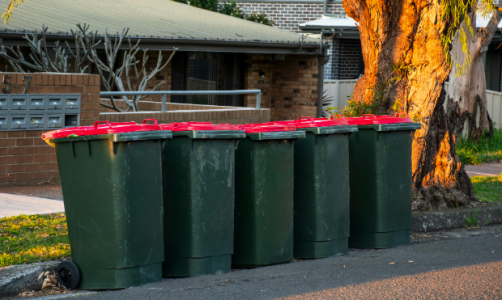Residents call out local council as weekly red garbage bin collection shifts to fortnightly
- Replies 43
Locals in certain parts of Sydney's Inner West are worried that their streets might smell worse as the weather heats up due to changes in how garbage is collected.
Starting from October 9, residents in the Inner West Council area will have their red garbage bins—which will contain sanitary products, nappies and pet litter—emptied every two weeks instead of weekly.
Green bins, where they're required to put organic food and garden waste, will be collected every week.
People are worried that the new system could lead to more rodents in the area, overflowing bins, and horrific odours, especially with waste sitting in bins for a fortnight.
Some residents also feel there hasn't been enough discussion with the community about these changes. The decision was also criticised as a 'one-size-fits-all approach' that does not consider the specific circumstances of different suburbs and households.
The council says these changes will save money by reducing the use of landfills and helping the environment. They also want to reassure residents that these changes won't affect their fees.

Dan Shaw, a local resident, said he only recently found out about the revised schedule after a heated post on a community Facebook group garnered an overwhelming response, with hundreds of reactions and comments pouring in.
'I'm annoyed at the lack of consultation and disclosure about the changes. While we need to support the environment and reduce waste, changes need to be carefully planned and implemented,' he said.
'Inner West Council seems to largely just make their own decisions and ignore community feedback. Not everyone even has space for (three) bins.'
Mr Shaw said the smell amidst the sweltering heat would be an issue. But, while his household is able to keep their bins away from their home, he felt bad for his neighbours who couldn't.
'We don't have babies, so no nappies in our bins, but there are plenty of young families around, and I feel sorry for them. With a very hot summer predicted, you'd think winter would be a more suitable time to trial this,' he argued.
In the post on social media, more and more residents are commenting to call out the council, calling their decision 'out of touch' and 'disastrous'.
'My red bin is full of nappies and cat litter every week. Inner city living means that our homes and blocks are small, so there's no space to store larger bins or new bins being rolled out. What do you propose we do?' wrote one woman.
Another agreed and added, 'My only spot where my bins fit is next to my kitchen. I eat a lot of seafood and have cat litter. My bins smell after a few days. I simply can't imagine what they would smell like after a week without collecting!'
A spokesperson for the Inner West Council said that despite the backlash, the environmental impact would be 'significant' and that the program would save ratepayers more than $370,000 per year in landfill needs.
Despite the scrutiny and doubt from some households, they emphasised that while this change may be 'challenging at first', it is worth it in the long run.
'Diverting food and garden waste from landfills is the single biggest thing we can do as a community to help combat climate change. After the initial rollout in October, we will review the data and have the resources to make modifications and changes if necessary.'
And for those concerned about odour issues, he suggested securely wrapping diapers, pads, period products, and pet waste before disposing of them in the red bin.
In March, we reported a similar incident, where residents of Greater Shepparton, a regional area north of Melbourne, weren't happy after their local council announced a significant change to the bin collection system.
Like the earlier story, red bins were announced to be collected fortnightly instead of weekly, sparking the same concerns.
'Do we just throw our garbage bags on the kerbside when the small bin gets full in the first week? This is just ridiculous,' one local commented on a Facebook post.
Another added, 'The council has this all wrong. Just leave it the way it is. Why change something that isn't broken?'
'It's going to be disgusting,' said a third. Read the full story here.
Some members also had a say in this matter. Member @Jennylolo argued, 'Bins shouldn't be overflowing for safety and health. But weekly red bins are often like this. I can't imagine if they were fortnightly.'
Member @PepeLePew was also in the same boat as some residents, saying: 'I live in Qld and would dread this happening here. I also rent, so I only have a small red lid bin that is pretty much filled up every week.'
Adding to the conversation, member @siameezer wrote, 'We have had this in my area of Melbourne for a couple of years now, and yes, it is a smelly inconvenience. Due to medical reasons, I have had to get a bigger red bin, and I am lucky that it actually lasts a fortnight before it is full.'
Member @Rowiee also offered another perspective, suggesting: 'It is basically forcing ratepayers to pay for a bigger red bin. More expense in this current climate.'

Members, what are your thoughts on these stories? We also want to ask: What is the schedule for bin collection in your area? Has it been working for you and your lifestyle so far, or do you think something needs to change there as well? Please let us know your thoughts in the comments below.
Starting from October 9, residents in the Inner West Council area will have their red garbage bins—which will contain sanitary products, nappies and pet litter—emptied every two weeks instead of weekly.
Green bins, where they're required to put organic food and garden waste, will be collected every week.
People are worried that the new system could lead to more rodents in the area, overflowing bins, and horrific odours, especially with waste sitting in bins for a fortnight.
Some residents also feel there hasn't been enough discussion with the community about these changes. The decision was also criticised as a 'one-size-fits-all approach' that does not consider the specific circumstances of different suburbs and households.
The council says these changes will save money by reducing the use of landfills and helping the environment. They also want to reassure residents that these changes won't affect their fees.

Garbage services will soon begin to collect (general waste) red bins fortnightly rather than weekly. Credit: Shutterstock.
Dan Shaw, a local resident, said he only recently found out about the revised schedule after a heated post on a community Facebook group garnered an overwhelming response, with hundreds of reactions and comments pouring in.
'I'm annoyed at the lack of consultation and disclosure about the changes. While we need to support the environment and reduce waste, changes need to be carefully planned and implemented,' he said.
'Inner West Council seems to largely just make their own decisions and ignore community feedback. Not everyone even has space for (three) bins.'
Mr Shaw said the smell amidst the sweltering heat would be an issue. But, while his household is able to keep their bins away from their home, he felt bad for his neighbours who couldn't.
'We don't have babies, so no nappies in our bins, but there are plenty of young families around, and I feel sorry for them. With a very hot summer predicted, you'd think winter would be a more suitable time to trial this,' he argued.
In the post on social media, more and more residents are commenting to call out the council, calling their decision 'out of touch' and 'disastrous'.
'My red bin is full of nappies and cat litter every week. Inner city living means that our homes and blocks are small, so there's no space to store larger bins or new bins being rolled out. What do you propose we do?' wrote one woman.
Another agreed and added, 'My only spot where my bins fit is next to my kitchen. I eat a lot of seafood and have cat litter. My bins smell after a few days. I simply can't imagine what they would smell like after a week without collecting!'
A spokesperson for the Inner West Council said that despite the backlash, the environmental impact would be 'significant' and that the program would save ratepayers more than $370,000 per year in landfill needs.
Despite the scrutiny and doubt from some households, they emphasised that while this change may be 'challenging at first', it is worth it in the long run.
'Diverting food and garden waste from landfills is the single biggest thing we can do as a community to help combat climate change. After the initial rollout in October, we will review the data and have the resources to make modifications and changes if necessary.'
And for those concerned about odour issues, he suggested securely wrapping diapers, pads, period products, and pet waste before disposing of them in the red bin.
In March, we reported a similar incident, where residents of Greater Shepparton, a regional area north of Melbourne, weren't happy after their local council announced a significant change to the bin collection system.
Like the earlier story, red bins were announced to be collected fortnightly instead of weekly, sparking the same concerns.
'Do we just throw our garbage bags on the kerbside when the small bin gets full in the first week? This is just ridiculous,' one local commented on a Facebook post.
Another added, 'The council has this all wrong. Just leave it the way it is. Why change something that isn't broken?'
'It's going to be disgusting,' said a third. Read the full story here.
Some members also had a say in this matter. Member @Jennylolo argued, 'Bins shouldn't be overflowing for safety and health. But weekly red bins are often like this. I can't imagine if they were fortnightly.'
Member @PepeLePew was also in the same boat as some residents, saying: 'I live in Qld and would dread this happening here. I also rent, so I only have a small red lid bin that is pretty much filled up every week.'
Adding to the conversation, member @siameezer wrote, 'We have had this in my area of Melbourne for a couple of years now, and yes, it is a smelly inconvenience. Due to medical reasons, I have had to get a bigger red bin, and I am lucky that it actually lasts a fortnight before it is full.'
Member @Rowiee also offered another perspective, suggesting: 'It is basically forcing ratepayers to pay for a bigger red bin. More expense in this current climate.'
Key Takeaways
- Anger is rising over a Sydney council's decision to collect red lid bins fortnightly instead of weekly without consulting locals appropriately.
- Concerns have been raised regarding the smell, rodents and potential overflowing bins, particularly during the sweltering summer temperatures.
- The decision has been criticised as a 'one-size-fits-all approach' that does not consider the specific circumstances of different suburbs and households.
- An Inner West Council spokesman highlighted the environmental impact of the changes and emphasised that modifications and adjustments can be made after the initial October rollout.
Members, what are your thoughts on these stories? We also want to ask: What is the schedule for bin collection in your area? Has it been working for you and your lifestyle so far, or do you think something needs to change there as well? Please let us know your thoughts in the comments below.







